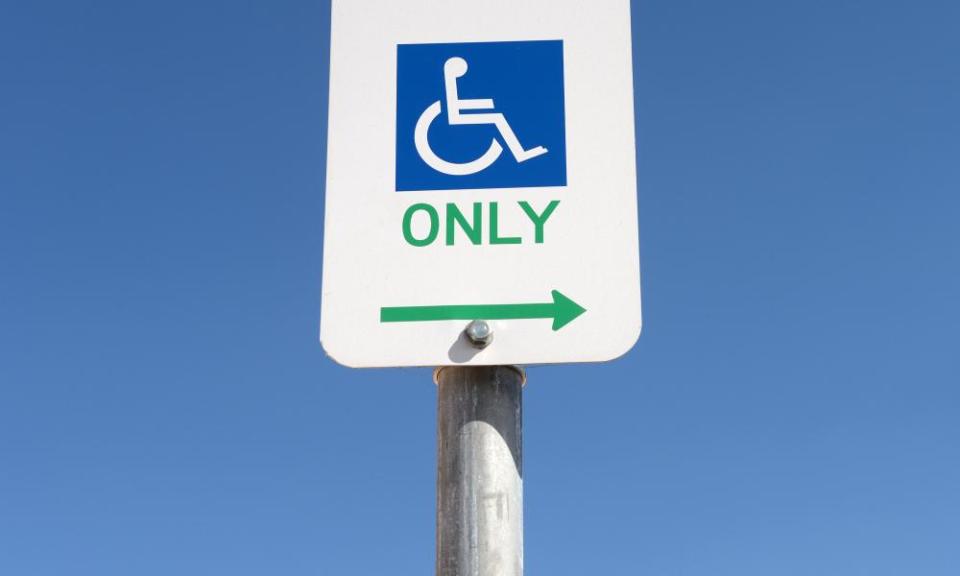‘Unconscionable’ to lift lockdowns before all Australians with disability can be vaccinated, inquiry says

The disability royal commission says governments should not lift lockdowns until all people with disability have had the “opportunity to be fully vaccinated” – even if states and territories hit the 70% fully vaccinated threshold.
In a scathing draft report handed down on Monday morning, the royal commission found the federal department of health’s approach to vaccinating people with disabilities had been “seriously deficient”.
People with disability living in shared accommodation, or “group homes”, were included in phase 1a of the vaccine rollout but then quietly “deprioritised” in favour of aged care residents.
Related: Some NSW communities to fall far short of 70% vaccination rate when Sydney reopens, analysis shows
The commission is now concerned people with disabilities will remain unprotected as states such as New South Wales and Victoria look to ease restrictions when 70% of the adult population is fully vaccinated next month.
“In our view, it would be grossly unfair, indeed unconscionable, if any people with disability who have not been given the opportunity to be fully vaccinated by the time the 70% threshold is reached are denied the freedoms available to people who have been fully vaccinated,” the report said.
“The unfairness is magnified once it is accepted – as it must be – that increased freedoms for the fully vaccinated increase the risk of contracting Covid-19 for people who are not fully vaccinated.
“It is one thing for people who choose not to be vaccinated to be denied these freedoms; it is quite another for people who have been denied the opportunity to be fully vaccinated also to be denied those freedoms.”
The report said the federal government should “use its best endeavours” to ensure no state or territory “significantly eases restrictions” when the 70% threshold is met unless all people with disability “have and appreciate that they have the opportunity to be fully vaccinated”.
The commission singled out national disability insurance scheme (NDIS) participants, people living in residential disability accommodation and people with intellectual disability as key groups. It said all active disability support workers should also be fully vaccinated before lockdowns are lifted.
Government data shows 66% of NDIS participants living in shared accommodation or “group homes” were fully vaccinated at 26 September, while 57.3% of NDIS screened workers had received two jabs.
Among all NDIS participants, not just those in group homes, 39.9% had been fully vaccinated at 15 September.
Its seven recommendations also included offering “appropriate supports” for people with intellectual disability to understand and access the vaccine and improved consultation and communication with disability groups.
It has been estimated nearly six out of every 10 people who died last year in England had a disability, while another study found people with learning disabilities were eight times more likely to die from Covid than the general population.
Guardian Australia on Saturday reported on concerns that many people with disability in NSW won’t be fully vaccinated when the state lifts stay-at-home orders for people who have received two jabs.
Asked about the royal commission’s recommendations on Monday, the NSW premier, Gladys Berejiklian, placed the blame with the federal government. She did not indicate any plans to delay the re-opening.
“We have done everything we can within our state jurisdiction,” she said. “There are certain areas of responsibility that the commonwealth has in terms of vaccine but we have stepped in and absolutely done everything we can to protect those that are most vulnerable within our jurisdiction and within the power that we have and we will continue to do that.”
In January, the federal health department said people living in disability group homes would be included in phase 1a of the vaccine rollout plan, the royal commission said.
Related: Fears vulnerable people on NDIS will be left unvaccinated when NSW reopens
But by the first week of March, the government “deprioritised the vaccination of people in residential disability accommodation” in a bid to focus on aged care vaccinations, it found.
The report said the government did not make this decision public until 20 April, meaning people with disabilities and their advocates were “misled into continuing to believe” group home residents would be prioritised.
The royal commission held hearings in May where many people with disability said they were “fearful and anxious about contracting Covid-19”, a situation worsened by the government’s poor communication with the disability sector.
“While there were numerous factors leading to vaccine hesitancy in mid-2021, the uncertainty and confusion may have contributed to vaccine hesitancy among some people with disability, including people at greatest risk of serious consequences from Covid-19, and among some disability support workers,” the report.
The royal commission said the government failed to genuinely consult with disability advocacy groups when establishing the rollout plan.
This meant the plan was established without the government “appreciating or addressing the challenges” associated with administering the vaccine to people living in disability residential settings and their support workers.
Once the federal government responds the report will be finalised and presented to the governor-general.
A spokeswoman for the federal health minister, Greg Hunt, said cases and lives lost among NDIS participants were “significantly lower than the national average”.
“As at 27 September 2021, the vaccination rate for NDIS participants 16 years and over and living in shared accommodation is 14% higher at 66% than that of the national average at 52%,” she said.
“People with disability continue to be prioritised for vaccinations. The government has implemented a range of measures, including visiting more than 4,000 sites as part of our in-reach program and the establishment of community-based vaccination hubs specifically for people with disability.”
The spokeswoman said the government would formally consider the recommendations and findings once the report is finalised and delivered to the governor-general.

 Yahoo Finance
Yahoo Finance 